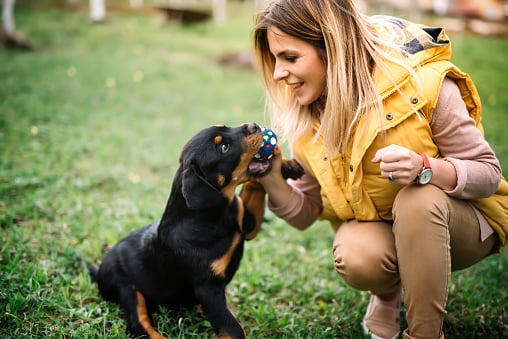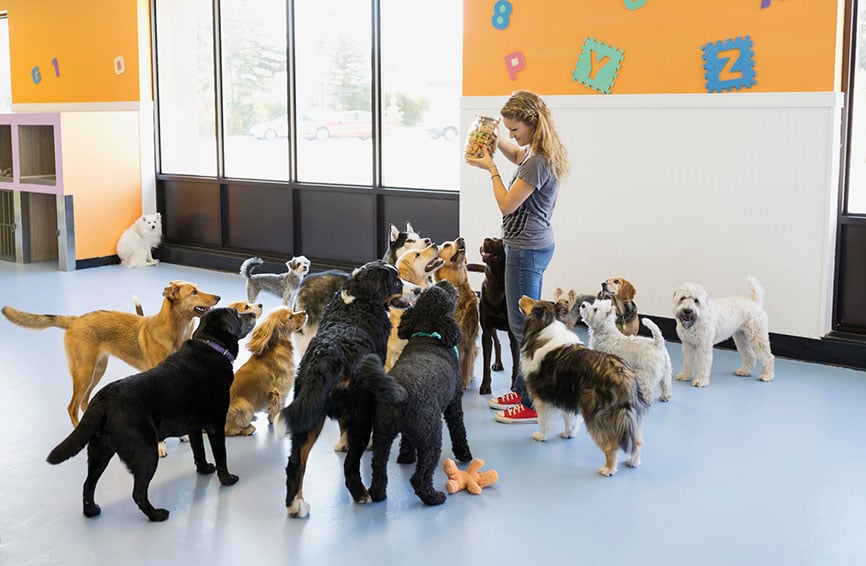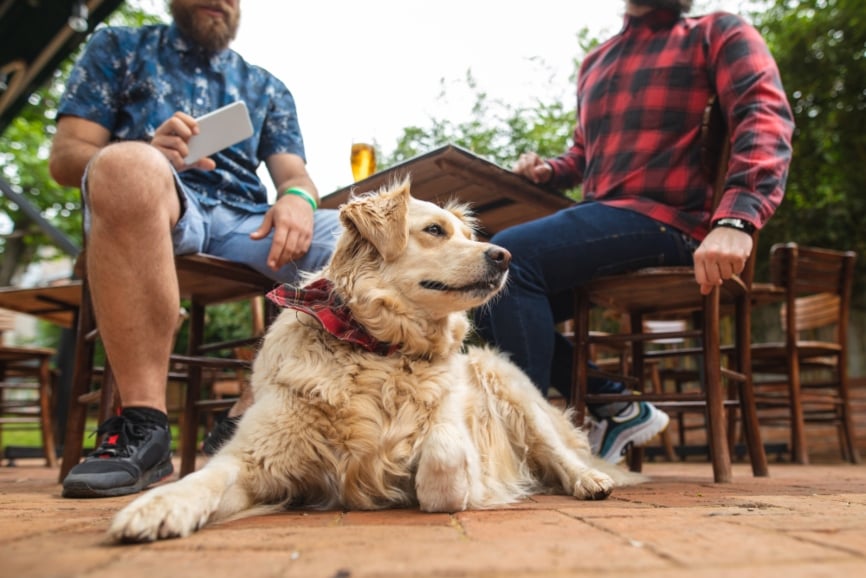The Rottweiler is a noble and majestic breed that’s sturdy, broad, and ready to give its humans full loyalty and a ton of love. It may come as a surprise to learn that they originally served as one of the very first police dogs, which is a testament to their discerning intelligence and unwavering guardianship. This black and tan pooch was also originally bred to herd cattle and pull carts, a fact that makes total sense when you consider their muscular build, strength, and stamina.
Breed Personality and Physical Description
Rottweilers, or Rotties for short, have the potential to be both brilliant guard dogs and companions. They’re affectionate, loyal, playful, kind to children, and their intelligence makes them very easy to train. This breed does require thorough training from puppyhood through adulthood in order to fit seamlessly into your family, neighborhood, and even society at large. These strong dogs have an inherent disposition to protect, and if it’s combined with a lack of training, it can make them unpredictable and even aggressive.

Though they seem ideal as the perfect watchdog, we recommend this breed for experienced owners who have the patience, desire, and know-how for training. If this is something you’re able to do, you’ll reap the reward of a steadfastly loyal, brawny best friend.
Physically, Rottweilers stand about two feet tall and weigh between 80 and 100 pounds for females and 95 to 135 pounds for males. Their life expectancy is roughly 10 years.
Breed History
The Rottweiler has a long history that can be traced back to the Roman Empire. It’s believed that this breed is a descendent of a Mastiff-like dog — called Drovers — that the Romans used to tend their flocks as they traveled across the continent conquering land. Eventually, the Romans were driven out by a group call the Swabians who lived near a town called Rottweil, but many of the dogs stayed.
The town of Rottweil was a trading epicenter, and the dogs — which eventually took on the name we know them as today — thrived here as both guardians and hardworking members of society. Over time, Rottweilers were soon sought after to be police and military dogs, blue-collar working dogs, and even dogs for the blind.
They became a formally recognized breed by the AKC in 1931, and since then their popularity has only risen. Today, they’re one of the top 10 most popular pure-bred dogs in the United States.
Common Health Issues
This robust breed is relatively healthy, but like any dog is prone to a few different medical conditions. The most common health issue Rotties experience is hip and elbow dysplasia, which can cause mild discomfort, pain, and lameness in extreme cases. Dysplasia can be detected via X-Ray, and there are steps you can take — such as keeping them at a healthy weight — that can prevent the condition from worsening.
They are also prone to experiencing a heart condition called Aortic Stenosis/Sub-aortic Stenosis, a constricting of the valves that can cause fainting and death; and osteosarcoma, a form of bone cancer. Yearly trips to the vet, a healthy diet, and immediate treatment any time you suspect an ailment, will help keep your Rottweiler healthy and happy. Make sure to enroll in pet insurance as early as possible, so future illnesses or accidents are covered, and you can get the treatment the vet recommends, and get reimbursed up to 90% of the vet bills.
Fun Facts
- A handful of notable celebrities have Rottweilers as family pets, including Will and Jada Pinkett Smith who own four of them, Bruno Mars, Leonardi DiCaprio, and Miley Cyrus.
- The Rottweiler almost went extinct in the mid-19th This occurred because the need for cattle herding plummeted as the world became more modernized. A small group of breeders ensured their survival, and their popularity picked back up in the early 1900s.
- This breed has an adorable reputation for being a “leaner.” They like to plop down and lean against people, which may be a residual tendency from their herding days.
Are you the proud parent of a Rottie? Share a picture of your four-legged friend with us on Instagram by tagging @gohealthypaws. And if you aren’t already a pet parent with us, look into getting a free quote to help safeguard not just your pawsome pooch, but your wallet too.








